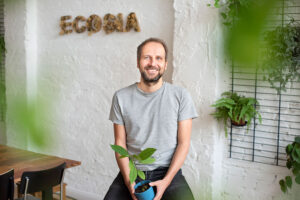
Uncommon Ground — America’s First Certified Organic Rooftop Farm
Founded by Helen and Mike Cameron, Uncommon Ground is America’s first certified organic rooftop farm.
USA, INDIA
Ia Yien Lei November 10, 2022
Born and raised in postcolonial Mumbai, India, and spending some of her childhood going to school in Italy, Sana Javeri Kadri would later go to college in the U.S where she developed her passion for food and culture. Although she majored in art in college, she always had a passion for food justice. While in college, she researched chocolate and coffee supply chains and began to dig deeper into the popular spice, turmeric. She saw an opportunity to positively impact the spice trade system to make a difference for the people who grow the spices.
In 2016, she booked a one-way ticket home to Mumbai and worked unpaid for many months in market research. She had an important life-changing meeting at the Indian Institute of Spices Research with Dr. Prasath, where she learned all about turmeric cultivation. She also visited over 40 farms. She began her company with just one organic spice, Pragati Turmeric – partnering with her farm partner Mr. Prabhu Kasaraneni. Kadri realized that there were more farmers like Mr. Prabhu and that she could impact other farmers’ lives through a direct trade model. At 23 years old in 2017, Diaspora Co. was born out of Kadri’s drive to build a more equitable spice trade in India.
Diaspora Co. is making a change by putting money, equity and power into the hands of Indian farmers to disrupt an outdated commodity spice trading system. Through the company’s business model, they make sure that the spices are harvested and sold in the same year and that their farm partners are living in good conditions and being paid fairly for their work. Diaspora Co. makes sure to go through extensive taste testing, and farm visits and collaborates with the Indian Council of Agricultural Research to source the best spices in South Asia. In addition, Kadri does everything she can to assist her partner farmers, including paying for healthcare, giving workshops and helping farmers create meaningful networks. Today the company sources 30 single-origin spices from 150 farms across India and Sri Lanka.
Kadri has been recognized by Forbes’ “30 Under 30” for her social enterprise.
Mood of Living: Where are you from? Where did you grow up?
Sana Javeri Kadri: I grew up in Mumbai, India, and spent some of my childhood going to school in Italy, as well. I came to the U.S. for college.
MoL: Where did you go to school? Did your studies inspire your career path? If so, how?
SJK: I spent my undergraduate years at Pomona College in Pomona, CA. I majored in art, but I was already really interested in food justice, so I took a number of courses about it. I joked to a professor that my dream would be to combine art and food justice — and funny enough, that’s exactly what I’m doing.
MoL: What was your profession before starting Diaspora Co.?
SJK: I was a photographer, and I also worked in marketing at Bi-Rite, which is an upscale San Francisco grocery store that sources thoughtfully and intentionally.
MoL: What inspired you to start your own spice company? What is so special and important about spices to you?
SJK: Back in 2016, turmeric was just everywhere. I had done a lot of research in school around supply chains – specifically for chocolate and coffee — and I started to dig into where all this turmeric came from. The spice trade hadn’t changed much since colonization, and I saw an opportunity to really impact the system and make a difference for the people who grow the spices.
MoL: Where is your company located? What influenced your locations? What are some challenges of having a company based in two different countries?
SJK: We’re based in Oakland, CA, and Mumbai. I’ve lived in Oakland for several years, and the ethos around here is definitely one that supports sustainability and social responsibility. We also have to have a solid footing in India, as that’s where we’re doing all of our on-the-ground sourcing and trying to create more opportunities, as well.
MoL: Can you explain more about the Diaspora Co. model? Why is it better than the traditional commodity model?
SJK: In the traditional model, spices would change hands multiple times before they even made it to the market — meaning, by the time they actually got on grocery store shelves, they were old and dusty. We sell our spices the same year they’re harvested so that they’re super fresh and packed with flavor. They go directly from the farmer to us for packaging, then right into the hands of the consumers.
MoL: How many farmers do you partner with? Where are your farmers located? How do you select the farmers you work with? And why?
SJK: You can find that info HERE
MoL: What is unique about the relationships between the spice farmers and your company? How are you positively impacting people’s lives?
SJK: We consider the farmers we work with to be true partners. We’re proud to pay our farm partners an average of 6x above the commodity price. In a system where fair trade is a mere 15% premium, we pay what we believe to be a living wage, an investment in the kind of leadership and land stewardship that will build climate resilience and more delicious food systems.
MoL: How do you source your farmers?
SJK: Spices can take us anywhere from a few months to several years to source, based on rigorous lab testing and in-person visits.
MoL: Where do you manufacture and package your products?
SJK: We recently just opened a new manufacturing facility in India, where we will do all of the production once we source the spices.
MoL: Where do you sell your products?
SJK: Most of our business is sold DTC from our website, although we’re also carried in a number of stores across the country.
MoL: What were some challenges you encountered when you founded Diaspora Co.? What are some challenges now? What have you learned in having your own business?
SJK: There have been so many challenges along the way, too many to count. During the pandemic, as was the case with many other companies, sourcing became a challenge. We would sell out of our most popular spices — which is a good thing because there was demand, but disappointing for consumers who couldn’t get access to the spices they wanted. We were relying on a pre-order model. One of the reasons we recently raised funding (see below) was to ensure that more spices would be more available year-round.
MoL: What are some of your future goals for Diaspora Co.? Are you working on any other projects?
SJK: We just recently secured $2.5 million in funding from a variety of sources. You can read more about the funding and where it will be put to use HERE.
MoL: What advice would you give to someone who wants to start a sustainable company?
SJK: Find good mentors! I’ve had so many throughout my career. Their impact has been immeasurable. In fact, we recently put together an official advisory board for Diaspora Co. comprised of other founders. Their input will help us to grow the company even further.
Photography courtesy of Diaspora Co.

Founded by Helen and Mike Cameron, Uncommon Ground is America’s first certified organic rooftop farm.

Ecosia, founded by Christian Kroll, is a sustainable search engine that turns searches into trees and is notably the first-ever German B-Corp.

CEO Omar Al Jundi built Badia Farms in 2016, a Dubai-based vertical farm solving food insecurity in the Middle East.